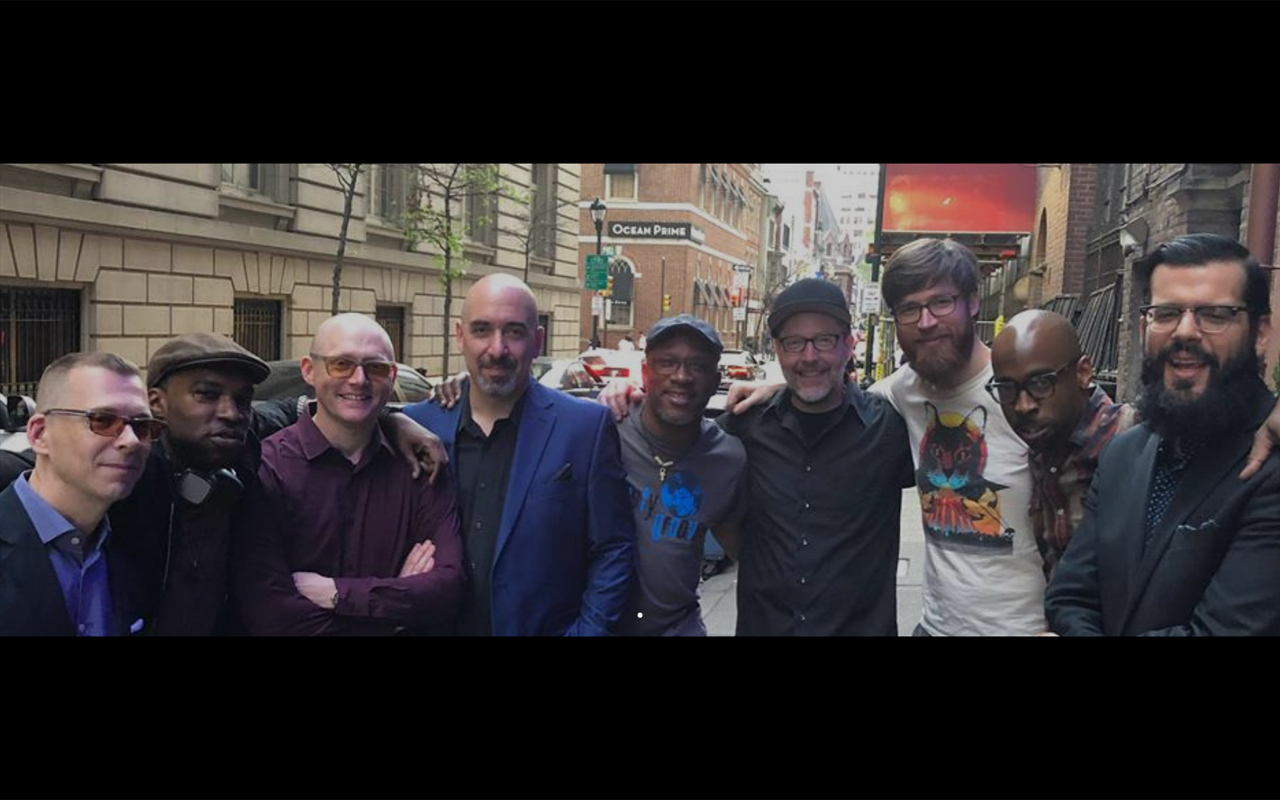
Captain Black Big Band photo courtesy of the artists.
Tuesday, April 2 & Wednesday,
April 3, 7:30pm
Royal Room
5000 Rainier Ave S
Pianist Orrin Evans leads the Grammy-nominated Captain Black in two nights of some of the most thrilling and enthralling little-big-band jazz in the land.
The band describes itself as “boasting a raw, vigorous sound, a raucous, unpredictable vibe, and a membership ranging from elders to rising stars,” and that’s all exactly right.
An added treat for Royal Room audiences is that the nonet will be joined by Seattle-based trumpet ace, Thomas Marriott.
Evans has of late risen to prominence after joining the power-jazz trio The Bad Plus in 2017, replacing Ethan Iverson, its founding pianist of 18 years. Evans’s tenure there is already affirmed by the trio’s continuing success, but his Captain Black Big Band at least equally expresses the nature of his musical vision. He founded it in 2009 as a nimble biggish band for long-term development of musical ideas— his, and those of other band members. Its first tenure was at Chris’ Jazz Cafe in his native Philadelphia; he then brought it to New Yorks’s Smoke Jazz & Supper Club as the large unit became increasingly tight and assured, even as it grew more and more
supple, surprising, and intrepid.
The results include the band’s third album release, Presence, out late last year. That followed 2011’s self-title debut and 2014’s Mother’s Touch. Captain Black was named Rising Star Big Band of the Year in the DownBeat Critics Poll, in 2013. Around that time, the magazine called Mother’s Touch “a sweet summertime powerhouse of a record that slips and slides with breathtaking compositions, arrangements, solos, and grandeur.”
Acclaim like that—and it has continued with high placing in DownBeat polls, ever since—has led to many other accolades, including such commissions as a suite honoring Sun Ra’s centenary, premiered at Jazz at Lincoln Center.
Born in Trenton, New Jersey, Evans grew up in Philadelphia, the son of an opera singer and playwright. He briefly studied jazz at Rutgers University, but dropped out to concentrate on gigging and, from the mid-1990s, releasing his own albums. (He has 25 of those to his name, now).
With early discs like a small-group Captain Black and Deja Vu, from around the turn of the century, he earned high praise from reviewers. The New York Times judged that on those albums he “offered magnetic up-tempo compositions and plangent ballads, usually with a hint of melancholy at every speed.”
Evans is steeped in piano-jazz history, and that includes in its championing of innovation. Evans has developed his vision of subtle keyboard evolution in a variety of roles. He has worked with the distinctive likes of saxophonist David Murray and trumpeter Sean Jones, the trio Tarbaby alongside allstar bassist Eric Revis and the drummer Nasheet Waits, and the neo-soul/acid jazz ensemble Luv Park.
Those all prepared him for stardom in The Bad Plus, where his visibility quickly increased, as evidenced by a (belated) personal Rising Star gong from DownBeat, last year. But his Captain Black aggregation emerged directly from Evans’s multi-year tenure in the New York weekly gigs of the Mingus Big Band. While that group is renowned in New York jazz circles for its consistent, dependably thrilling sound, Evans conceived Captain Black as a Philadelphia seedbed of new ideas for jazz big band, and as a moving feast of older and emerging talent. (He named the band, and that early trio album, after his father’s favorite brand of tobacco.)
At first Evans peopled Captain Black with students from Philadelphia university jazz programs, bolstered by some New York veteran friends. He soon had a healthy rotation of bigger names to draw on—Tia Fuller, Jack Walrath, Frank Lacy, Ralph Peterson, Marcus Strickland and so on.
By now the band has settled into a lineup of outstanding performers and composers (whose pieces appear alongside Evans’s in the band’s songbook) such as those who will appear in Seattle. Among them are David Gibson on trombone, Josh Lawrence on trumpet, and Caleb Wheeler Curtis on alto sax. The big band is not the only vehicle for the undoubted expansive talents of Orrin Evans – another recent expression of those is his dazzling release with bassist Christian McBride and drummer Karriem Riggins, and of course a third is the refreshed Bad Plus—but it only adds to his growing reputation. Last year in the New York Times, Giovanni Russonello summed that up, calling Evans “a viable candidate for jazz’s most resourceful and invigorating contemporary pianist.”
–Peter Monaghan
Tickets and information available at earshot.org. Tickets do not guarantee seating at Royal Room shows. For dinner reservations, contact the Royal Room at reservations@royalroomseattle.com.